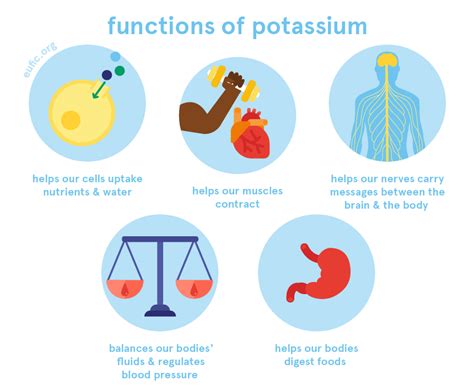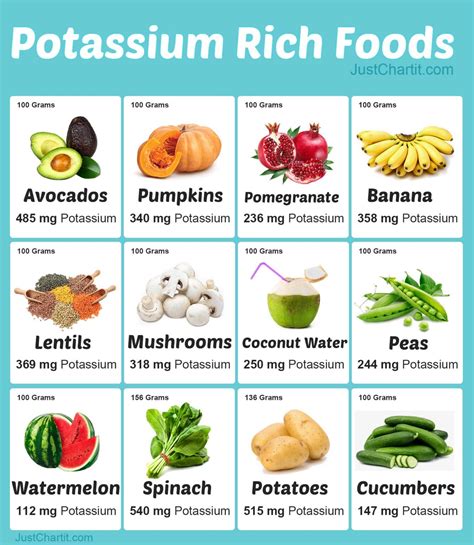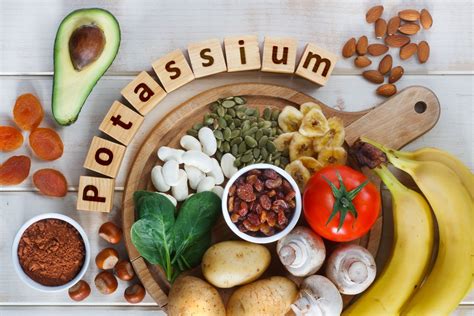Intro
Boost health with potassium rich foods, reducing blood pressure and promoting overall wellness through balanced diets, nutritious eating, and healthy lifestyle choices.
The importance of maintaining a balanced diet cannot be overstated, and one crucial aspect of this balance is ensuring adequate intake of essential nutrients like potassium. Potassium is a vital mineral that plays a significant role in various bodily functions, including muscle contractions, nerve impulses, and heart health. Without sufficient potassium, individuals may experience a range of health issues, from mild fatigue and muscle cramps to more severe conditions like heart arrhythmias. Incorporating potassium-rich foods into one's diet is an effective way to mitigate these risks and foster overall well-being.
A diet rich in potassium can have profound effects on health, ranging from lowering blood pressure and reducing the risk of cardiovascular disease to supporting bone health and aiding in the management of diabetes. Given the broad spectrum of benefits associated with potassium intake, it's essential for individuals to understand which foods are high in potassium and how to incorporate these into their daily meals. From bananas and avocados to spinach and sweet potatoes, the variety of potassium-rich foods available ensures that there are options to suit every palate and dietary preference.
Understanding the significance of potassium in the diet and identifying the best sources of this mineral are the first steps towards leveraging its health benefits. As individuals navigate the complexities of modern nutrition, focusing on whole, unprocessed foods is a practical strategy for meeting potassium needs. These foods not only provide potassium but also a wealth of other vitamins, minerals, and antioxidants that contribute to a healthy and balanced diet. By exploring the diverse range of potassium-rich foods and learning how to incorporate them into daily meals, individuals can take a proactive approach to their health, potentially reducing the risk of chronic diseases and improving their overall quality of life.
Potassium's Role in the Body

Potassium plays a critical role in the body, acting as an electrolyte that helps maintain the balance of fluids within cells. It is essential for the proper functioning of muscles and nerves, facilitating the transmission of nerve impulses and the contraction and relaxation of muscles. Potassium also supports heart health by helping to regulate blood pressure and prevent arrhythmias. Furthermore, it aids in the transport of nutrients and waste products in and out of cells, supporting overall cellular health.
Benefits of Potassium-Rich Foods
The benefits of consuming potassium-rich foods are multifaceted, impacting various aspects of health and well-being. Some of the key advantages include: - Lowering blood pressure: Potassium helps to balance out the effects of sodium in the body, which can contribute to high blood pressure. - Reducing the risk of cardiovascular disease: By helping to lower blood pressure and support overall heart health, potassium can play a role in reducing the risk of heart disease, strokes, and other cardiovascular conditions. - Supporting bone health: Potassium, particularly in the form of potassium citrate, can help to preserve bone density, reducing the risk of osteoporosis and fractures. - Aiding in the management of diabetes: Potassium can help to regulate blood sugar levels and improve insulin sensitivity, making it beneficial for individuals with diabetes.Top Potassium-Rich Foods

Incorporating potassium-rich foods into one's diet is straightforward, given the wide variety of options available. Some of the top potassium-rich foods include:
- Bananas: One of the most well-known sources of potassium, bananas are a convenient and tasty way to boost potassium intake.
- Avocados: Not only are avocados rich in potassium, but they also provide healthy fats, fiber, and various vitamins and minerals.
- Spinach: This leafy green is packed with potassium, as well as vitamins A and K, and iron, making it a nutrient-dense addition to meals.
- Sweet Potatoes: Rich in potassium, vitamin A, and fiber, sweet potatoes are a nutritious alternative to regular potatoes.
- Salmon: Fatty fish like salmon are not only high in potassium but also provide omega-3 fatty acids, which support heart health and brain function.
Incorporating Potassium-Rich Foods into Your Diet
Incorporating potassium-rich foods into daily meals can be achieved through a variety of simple and delicious methods: - Start the day with a potassium-rich breakfast, such as oatmeal with banana and almond butter or scrambled eggs with spinach. - Add avocado to salads, sandwiches, and soups for a potassium and healthy fat boost. - Use herbs and spices to season meals instead of salt, and include potassium-rich ingredients like sweet potatoes and salmon in your recipes. - Snack on fresh fruits and vegetables, such as apples, carrots, and bell peppers, which are all good sources of potassium.Potassium Deficiency and Its Effects

A deficiency in potassium, known as hypokalemia, can have significant health implications. Symptoms of hypokalemia can range from mild to severe and include:
- Muscle weakness and cramps
- Fatigue and lethargy
- Heart palpitations and arrhythmias
- Constipation
- Abnormalities in heart function, which can be life-threatening in severe cases
Causes of Potassium Deficiency
Potassium deficiency can result from a variety of factors, including: - Inadequate dietary intake: Not consuming enough potassium-rich foods can lead to a deficiency over time. - Excessive potassium loss: This can occur due to prolonged vomiting, diarrhea, or the use of certain medications like diuretics. - Underlying medical conditions: Certain conditions, such as kidney disease, can affect the body's ability to regulate potassium levels.Conclusion and Future Directions

In conclusion, potassium is a vital nutrient that plays a critical role in maintaining various bodily functions. Incorporating potassium-rich foods into one's diet is a simple yet effective way to support overall health and reduce the risk of chronic diseases. By understanding the importance of potassium, identifying rich sources of this mineral, and incorporating these foods into daily meals, individuals can take a proactive approach to their health. As research continues to unveil the benefits of potassium, it is clear that this nutrient will remain a significant focus in the realm of nutrition and health.
Final Thoughts on Potassium-Rich Foods
The journey to better health through potassium-rich foods is accessible and rewarding. With a little creativity and planning, individuals can ensure they are meeting their daily potassium needs. Whether through bananas and avocados, spinach and sweet potatoes, or salmon and other fatty fish, the options are diverse and delicious. As we look to the future, embracing a diet rich in potassium and other essential nutrients will be crucial in fostering a society that values health, wellness, and the prevention of disease.What are the primary benefits of consuming potassium-rich foods?
+The primary benefits include lowering blood pressure, reducing the risk of cardiovascular disease, supporting bone health, and aiding in the management of diabetes.
Which foods are the richest sources of potassium?
+Top sources include bananas, avocados, spinach, sweet potatoes, and salmon, among others.
What are the symptoms of a potassium deficiency?
+Symptoms can range from mild to severe and include muscle weakness, fatigue, heart palpitations, and constipation, among others.
We invite you to share your thoughts on the importance of potassium-rich foods and how you incorporate them into your diet. Your experiences and tips can help others on their journey to better health. Feel free to comment below, and don't forget to share this article with friends and family who might benefit from learning more about the power of potassium.
